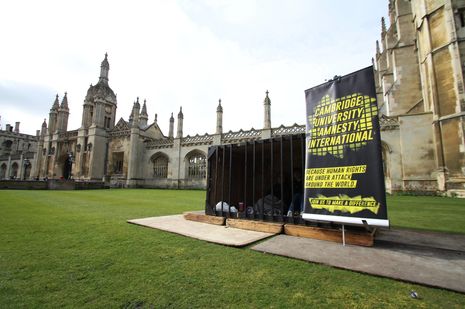Students’ annual ‘Cage Campaign’ forced to evacuate after facing verbal assault on first night
This year’s 48-hour campaign focuses on Shell’s treatment of the Ogoni people in Nigeria, and calls for the University to cut ties with the oil giant

The continuation of Cambridge University Amnesty International’s (CUAI) 41st ‘Cage Campaign’, who this year are protesting University ties with Shell, has been thrown into doubt after students were physically threatened on the first night of the action.
This year’s campaign, which focuses on alleged mistreatment of the Ogoni people in Nigeria by the Dutch oil giant, began at 6pm on Friday and is due to finish on Sunday. But CUAI described to Varsity how at around 7.30pm on Friday, a man “angrily” approached the cage, and verbally abused the volunteers.
According to CUAI, the individual then tried to enter the cage with two female volunteers, resulting in the cage being vacated until 8am on Saturday morning.
The annual Cage Campaign ordinarily sees Cambridge students continuously occupy a cage set up on the King’s College front lawn for 48 hours in support of Amnesty campaigns. Usually, two volunteers would be caged at any one time, taking 2-hour shifts during the day, and 10 hour shifts, from 10pm-8am, in the evening.
Henry Weighill, organiser of this year’s campaign, explained that the ‘Ogoni Nine’ were chosen as the focus of this year’s campaign “because it fits with a lot of the current themes” which are of concern to CUAI, particularly issues of divestment, the actions of large corporations, environmental damage and human rights abuses.
The Ogoni Nine were nine activists from the region of Nigeria, executed in 1995 after openly criticising and trying to fight the practices of Shell oil. The Ogoni people have long opposed the presence of Shell in the region, perceiving the corporation to excessively harvest resources and damage the local environment and its dependent communities.
It is alleged that Shell was complicit in the Nigerian government’s execution of the Ogoni nine.
The international community has also raised concerns about oil extraction in Ogoniland. Oil extraction since the 1950s has resulted in the contamination of drinking water, damage to mangroves-nurseries for fish and a series of oil spills which can result in fires and make land difficult to revegetate.
This year’s protest is accompanied by an online petition, which calls to “force Cambridge to cut ties with Shell”, which includes rejecting “funding and permitting [its] presence at University events”.
But Weighill also explained that other factors may cause CUAI to reconsider future campaigns due to homelessness in Cambridge.
“It might be time to do away with the night shift because it might be insensitive to the city’s homeless populations,” he said.
Last November, it emerged that Cambridge accepted a £6 million donation from Shell to fund research into oil extraction, while in 2017, a member of the Shell executive committee stated that he was “fundamentally proud” of the company’s actions in Nigeria, in the annual Shell lecture held at Emmanuel College.
“The University needs to hold itself to higher values than co-operating with a company that destroys [the] lands of indigenous communities for profit,” said the CUAI organisers.
Weighill added CUAI “want the University to acknowledge what Shell has done because Shell has a large presence in some University departments”.
Shell has previously been opposed by Cambridge Zero Carbon Society, particularly in a series of events in Michaelmas 2018. This included disrupting the 2018 annual Shell lecture, which was also held at Emmanuel, as well as interrupting a breakfast recruitment event.
In response to the protest, a University spokesperson told Varsity that “the University respects the right of people to protest but will not be issuing a statement on this occasion”.
Last year’s Cage Campaign focused on the imprisonment of Cambridge PhD student and activist Peter Biar Ajak, who faced the death penalty in South Sudan but was pardoned by the country’s President in January.
When asked why the group chose to focus on Shell instead of another Cambridge student, specifically the detention of Wolfson alumna Dr Kylie Moore-Gilbert in Iran, Weighell said “we choose one topic each year and although we would like to cover more, our message is powerful when we focus on one specific issue”.
Moore-Gilbert, a British-Australian academic who graduated with a degree in Asian and Middle Eastern Studies from Wolfson College in 2013, is currently serving a 10-year sentence in Tehran for espionage.
The CUAI Cage Campaign has previously sought to raise awareness of the use of torture by the UK and US governments and imprisonment in Guantanamo Bay.
 Features / Should I stay or should I go? Cambridge students and alumni reflect on how their memories stay with them15 December 2025
Features / Should I stay or should I go? Cambridge students and alumni reflect on how their memories stay with them15 December 2025 News / Cambridge study finds students learn better with notes than AI13 December 2025
News / Cambridge study finds students learn better with notes than AI13 December 2025 News / Dons warn PM about Vet School closure16 December 2025
News / Dons warn PM about Vet School closure16 December 2025 News / News In Brief: Michaelmas marriages, monogamous mammals, and messaging manipulation15 December 2025
News / News In Brief: Michaelmas marriages, monogamous mammals, and messaging manipulation15 December 2025 Comment / The magic of an eight-week term15 December 2025
Comment / The magic of an eight-week term15 December 2025










